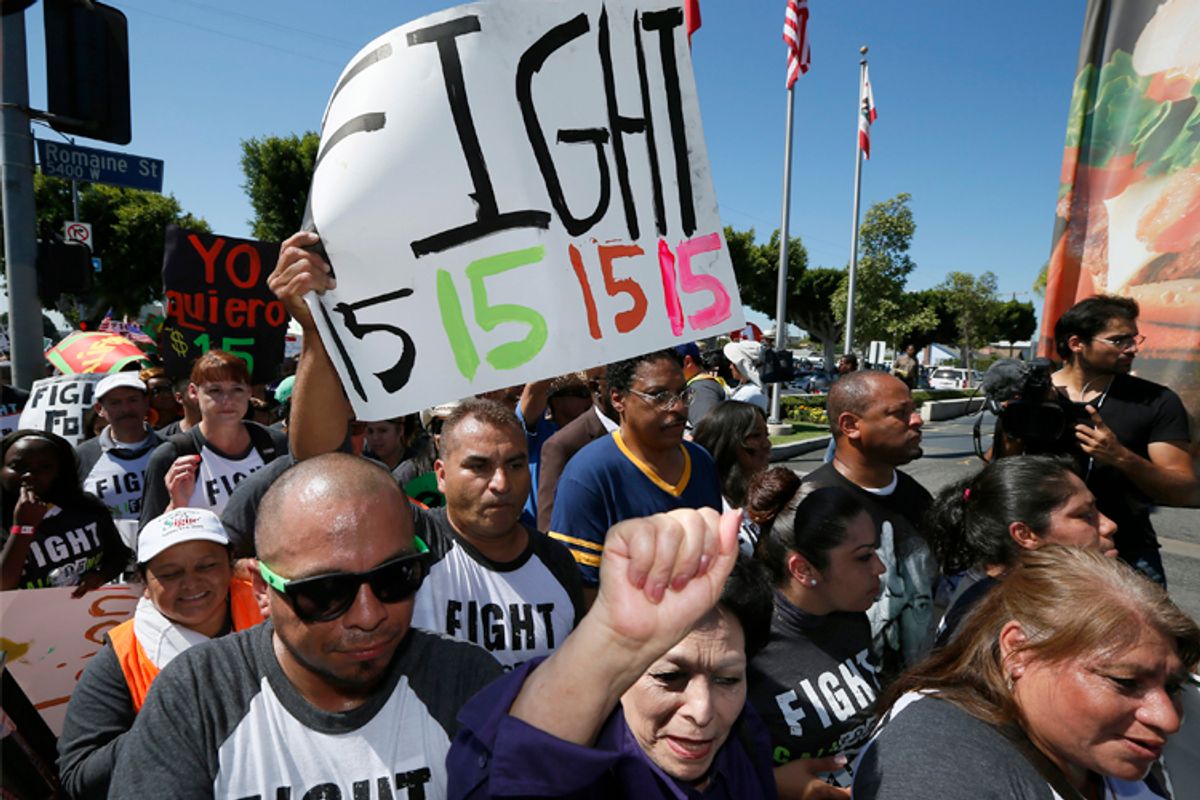In a unanimous Tuesday vote, a Los Angeles City Council committee voted to authorize a study on nearly doubling the minimum wage for employees of large hotels in the nation’s second-largest city. The L.A. proposal is one of several municipal moves toward raising wages well above the 5-year-old federal rate of $7.25; at $15.37, it would set a local hotel industry wage floor far beyond the $10.10 proposed by congressional Democrats.
“I’m 38 years old,” hotel worker Melinda Miyashiro told the committee, according to her prepared remarks. “My husband and I want to start a family – but I can’t see how we could afford it.”
The proposal for a study -- on the “citywide economic impact” of a hotel wage hike, due in 45 days -- was introduced last week by L.A. council members Mike Bonin, Nury Martinez and Curren Price. The proposed $15.37 mandate is backed by a coalition including the hotel union UNITE HERE (my former employer), and the union-backed nonprofit Los Angeles Alliance for a New Economy. In a Tuesday email, LAANE deputy director James Elmendorf described the vote as a “pretty simple first step,” but said, “We are pleased that they are moving quickly.” Carol Schatz, who leads the business group Central City Association, told the L.A. Times last week that her group saw starting with a study as “a great victory,” because “We have been saying we understand the reasons you want to do this, but the question is, what are the possible unintended negative economic impacts?”
In contrast, Elmendorf cites a LAANE estimate that the proposed raise would net $71 million in additional spending in the Los Angeles economy. For “low-wage workers,” he told Salon last month, “It is the marginal difference between whether they go to the dry cleaners, or whether they go out to … get a meal, or buy a coffee.” Elmendorf defended the proposed particular focus on the hotel industry on the grounds that it was “a sticky industry” unlikely to pull up roots in order to shirk higher pay; “a growing industry where the city has invested billions”; a linchpin of L.A.’s tourism economy; and “one of the top two” in terms of the number of workers in poverty.
Elmendorf credited L.A.’s progress toward a hotel wage law to a mix of national and local pressures, including both the “tremendous energy” of striking fast food and Wal-Mart employees, and a series of L.A.-area wage laws pegged to certain industries, jurisdictions and/or municipal contracts. Previous labor-backed hotel wage hikes covered Emeryville (passed in 2005); L.A.’s Century Boulevard (2007); and Long Beach (2012). Each of those, argued Elmendorf, “have proven successful,” but “not enough.”
The Los Angeles vote came the same day that Santa Fe, N.M., county commissioners voted unanimously to extend a city living wage law to the whole county, and one day before retail and janitorial workers rally in Minneapolis for a statewide raise. It comes as New York City’s new mayor urges the state to authorize the city to raise its minimum wage; Connecticut’s governor has proposed raising the state standard to $10.10; a Michigan coalition is collecting signatures to put $10.10 on the statewide ballot; business and labor are headed to court over the scope of a $15 wage law passed in tiny SeaTac, Wash.; the D.C. City Council has unanimously passed an $11.50 measure; President Obama has signed an executive order requiring a $10.10 wage under federal contracts; and a commission established by Seattle Mayor Ed Murray is tasked with bringing the City Council a proposal for tackling inequality.
Mayor Murray told Salon days after his January inauguration that Seattle’s public employees “should have confidence” they’d reach a $15 minimum “in the next several months,” and that “I think we are gonna get to $15” for the city’s private sector workforce also. Local Service Employees International Union president David Rolf, whose international union has been the key player in funding, fomenting and directing the fast food campaign, is co-chair – with Seattle Hospitality Group CEO Howard Wright – of that commission. Rolf last month told Salon that speculation has emerged that if the group is unable to coalesce behind a compromise, pro-business groups would put forward their own “$15” proposal, “that would probably have a lot of exemptions, a lot of tax breaks.” Rolf said he found it “interesting” that “even on the business side of things, things are being framed around $15 … The general flavor of the discussion in Seattle is not $15 versus $9.32. It’s how to get to $15.”
Rolf credited that momentum to a collision of several factors over the past year, including “absolutely critical” strikes by fast food workers; the SeaTac $15 initiative “that was itself the product of a multi-year union coalition effort”; wage debate in the mayoral election; wage hikes elsewhere in the country; “the surprise election of a socialist council member running on a $15 platform”; and “the underlying fact that we have had 30 years of wage-less economic growth, and … the last decade has been jobless economic growth.” Rolf added, “Politicians generally are relatively late to the party on these things.”



Shares